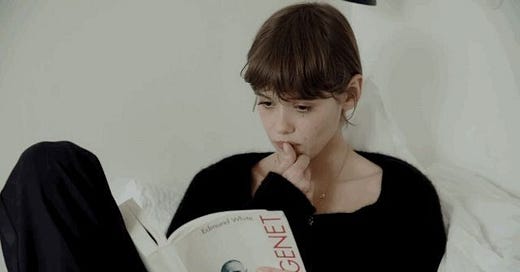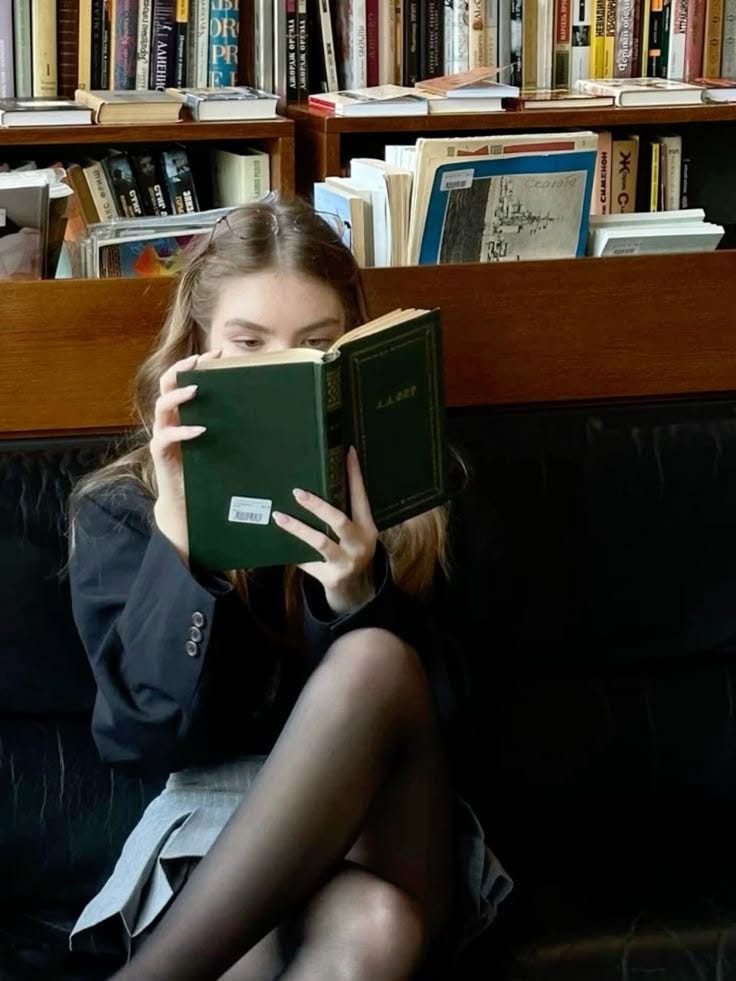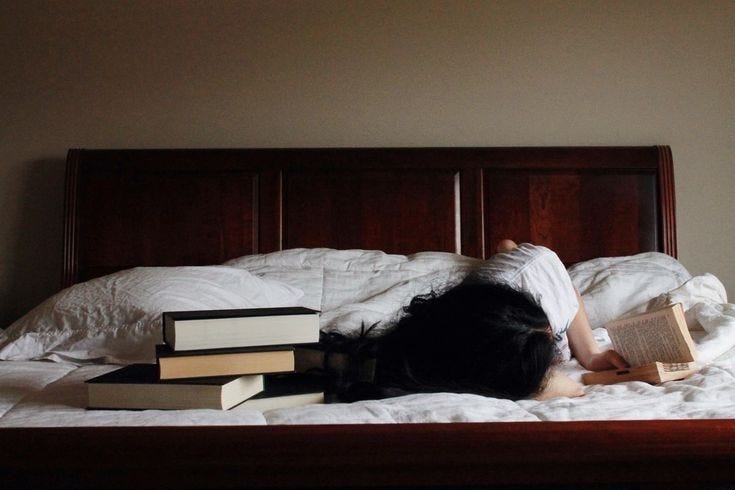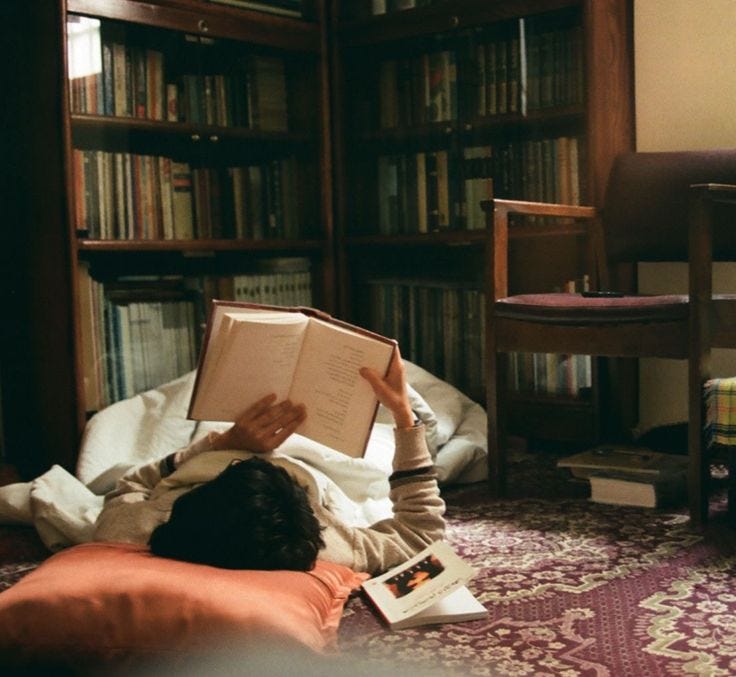hello.
classical literature has always felt like a lifeline to me—more than just stories, these books have shaped the way i see the world, deepened my understanding of human nature, and made me feel less alone in the vast, endless complexity of existence. if philosophy teaches us how to think, classic literature teaches us how to feel. it pulls us into conversations that span centuries, connects us with minds long gone, and reminds us that every struggle, every longing, every moment of doubt we experience has been felt before.
i’ll never forget when my university advisor insisted i switch my major to english because it was easier, claiming i lacked the capacity or means to thrive in science. (a story for another time) the suggestion wasn’t just condescending—it was a humiliating, quiet condemnation of my ambition and intelligence. in the end, the joke was on him because i ended double majoring in english and stem.
i had been raised to believe that the arts were a consolation prize, a path for those who weren’t sharp enough, disciplined enough, or relentless enough to pursue something as prestigious as science, math, medicine—those were the fields of true intellect. literature and philosophy were mere indulgences for the directionless.
this illusion was shattered the moment i understood what great art and thought demand. the most urgent questions about existence don’t belong to science alone; they live in the pages of novels, in philosophy’s relentless pursuit of truth. to dismiss the humanities is to misunderstand not just intellect, but the very essence of human thought.
with classical literature especially, there’s a reason these books endure. they contain truths that remain relevant no matter how much time passes, offering insight into love, power, morality, ambition, and the tension between fate and free will. they are, at their core, books about being human. whether it’s dostoevsky forcing you to wrestle with guilt and redemption, woolf capturing the fleeting nature of time and memory, or tolstoy making you confront the weight of a life half-lived, these stories refuse to let you remain unchanged.
as we long for spring and head into the final days of winter, i find myself drawn to these books even more. winter always feels like the season of introspection, and classic literature, with its depth and richness, fits the mood perfectly. these are the books that demand your full attention, that ask you to slow down, think deeply, and surrender to something greater than yourself.
below, i’m sharing some of my favorites—books that have changed me, shaped me, and stayed with me long after i turned the last page. if you’ve never read classics before, consider this your invitation. if you already love them, then you know exactly what i mean.
my favorite classic literature books:
the brothers karamazov – fyodor dostoevsky: a philosophical novel that grapples with faith, free will, and morality through the complex relationships of the karamazov brothers. each brother represents a different ideological struggle—reason vs. faith, passion vs. logic, morality vs. nihilism—culminating in a murder trial that questions the very nature of justice.
giovanni’s room – james baldwin: a haunting, deeply introspective novel about love, shame, and identity, following an american man in paris who grapples with his attraction to men, particularly the enigmatic giovanni. baldwin’s prose is both lyrical and devastating, capturing the suffocating weight of societal expectations, internalized homophobia, and the tragic impossibility of living freely in a world that demands conformity.
anna karenina – leo tolstoy: a tragic novel about love, betrayal, and societal constraints, centered on anna’s doomed affair with vronsky and contrasted with levin’s search for meaning. tolstoy weaves a vast, intricate portrait of russian aristocracy, capturing both its glittering opulence and its deep existential struggles.
frankenstein – mary shelley: often considered the first true science fiction novel, this gothic tale explores the dangers of unchecked ambition and the consequences of playing god. victor frankenstein’s obsession with creating life leads to his own ruin, while the creature, abandoned and misunderstood, raises questions about humanity and responsibility.
dracula – bram stoker: an epistolary gothic horror novel that defined the modern vampire myth, following count dracula’s attempt to spread his dark influence to england. blending victorian fears of disease, sexuality, and foreign invasion, the novel remains hauntingly atmospheric and deeply psychological.
the strange case of dr. jekyll and mr. hyde – robert louis stevenson: a dark psychological thriller about the duality of human nature, following a scientist who creates a potion to separate his good and evil selves. as mr. hyde grows stronger and more uncontrollable, the novella examines repression, morality, and the hidden darkness in every person.
the turn of the screw – henry james: a chilling ghost story that plays with ambiguity and psychological horror, centered on a governess who believes her young charges are being haunted. the novel’s brilliance lies in its uncertainty—is she truly seeing ghosts, or is she slowly losing her grip on reality?
rebecca – daphne du maurier: a gothic suspense novel filled with haunting memories and an ever-present, spectral first wife. the unnamed narrator struggles with jealousy and insecurity as she lives in the shadow of the enigmatic and seemingly perfect rebecca, whose influence lingers even after death.
the monk – matthew lewis: a shocking and scandalous gothic novel about a supposedly virtuous monk’s descent into temptation, sorcery, and violence. its grotesque imagery and supernatural elements push the boundaries of morality and horror, making it one of the most extreme gothic novels of its time.
carmilla – sheridan le fanu: a proto-vampire novel filled with eerie gothic atmosphere and rich with queer subtext, centering on a mysterious woman who preys on young girls. predating dracula, it explores themes of obsession, seduction, and the supernatural in an intoxicatingly dreamlike way.
we have always lived in the castle – shirley jackson: a dark, unsettling novel narrated by merricat blackwood, a deeply unreliable and isolated young woman. the book masterfully builds suspense as secrets about her family’s tragic past unfold, leading to an eerie meditation on isolation, persecution, and psychological instability.
the haunting of hill house – shirley jackson: a masterpiece of psychological horror, following a group investigating a haunted mansion where reality and delusion blur. at its heart, the novel is a study of loneliness and repression, as the protagonist, eleanor, forms a dangerously intimate connection with the house itself.
villette – charlotte brontë: a deeply introspective novel about lucy snowe, an intelligent and solitary woman navigating life in a foreign country. less romantic than jane eyre, it is more psychological and melancholic, exploring themes of isolation, longing, and unfulfilled desire.
the bluest eye – toni morrison: a harrowing and lyrical novel about internalized racism, beauty standards, and the psychological destruction of a young black girl, pecola breedlove, who longs for blue eyes, believing they will make her loved and worthy. morrison’s debut is both haunting and poetic, peeling back the layers of societal cruelty, intergenerational trauma, and the devastating consequences of oppression with prose that is both tender and unflinching.
brideshead revisited – evelyn waugh: an elegiac novel about memory, love, faith, and the decline of the english aristocracy, told through the lens of charles ryder’s infatuation with the wealthy and troubled flyte family. at its core, it’s a deeply nostalgic and melancholic meditation on beauty, decadence, and the loss of innocence, with a profound undercurrent of longing—both romantic and spiritual. waugh’s prose is lush and reflective, capturing the intoxicating charm of youth and privilege while also exposing its inevitable decay.
crime and punishment – fyodor dostoevsky: a philosophical and psychological novel about raskolnikov, a destitute student who murders a pawnbroker to test his theory of extraordinary individuals. wracked with guilt, he is drawn into a cat-and-mouse game with the relentless detective porfiry petrovich, leading to an exploration of morality, redemption, and justice.
the master and margarita – mikhail bulgakov: a satirical, surreal novel set in soviet russia, where the devil and his mischievous entourage wreak havoc in moscow. interwoven with a parallel story about pontius pilate, it critiques authoritarianism, censorship, and the absurdity of power with biting humor and magical realism.
the trial – franz kafka: an existential nightmare about josef k., a man arrested for an unknown crime, trapped in a faceless bureaucratic machine. as he struggles to understand his trial, the novel paints a harrowing portrait of absurdity, guilt, and the inescapable nature of judgment.
the odyssey – homer: an epic poem following odysseus’s ten-year journey home after the trojan war, encountering mythical creatures, divine interventions, and personal trials along the way. beyond its adventure, the poem explores themes of perseverance, identity, loyalty, and the human struggle against fate, making it one of the most enduring stories of heroism and homecoming.
the iliad – homer: a timeless epic poem that recounts the final weeks of the trojan war, focusing on achilles’ rage and the fates of great warriors. filled with divine intervention, brutal combat, and poetic grandeur, it remains one of the foundational works of western literature.
the divine comedy – dante: a visionary journey through hell, purgatory, and heaven, guided first by virgil and then by beatrice. deeply theological and allegorical, it maps the medieval conception of sin, salvation, and the afterlife in strikingly vivid poetry.
the picture of dorian gray – oscar wilde: a decadent gothic novel about a young man who sells his soul for eternal youth, while his hidden portrait reflects his moral decay. a sharp critique of aestheticism and hedonism, it remains both darkly seductive and philosophically compelling.
the myth of sisyphus – albert camus: a foundational work of absurdist philosophy, questioning whether life is worth living in a world without inherent meaning. camus proposes that, like sisyphus endlessly rolling his boulder uphill, we must find happiness in the struggle itself.
to the lighthouse – virginia woolf: a modernist masterpiece that captures the fleeting nature of time, memory, and human consciousness. its experimental structure and lyrical prose create an intimate exploration of family, loss, and the passage of life.
ulysses – james joyce: one of the most ambitious novels ever written, following a single day in the life of leopold bloom in dublin. through stream-of-consciousness narration and dense literary allusions, joyce transforms the ordinary into the mythic.
jane eyre – charlotte brontë: a deeply personal and passionate novel about a woman’s fight for independence, self-respect, and love. blending gothic elements with a strong, moral heroine, it remains one of the most beloved novels of all time.
middlemarch – george eliot: an intricate, multi-layered novel examining marriage, ambition, and social change in a provincial town. considered one of the greatest english novels, it offers deep psychological insight into human nature.
the house of mirth – edith wharton: a tragic novel about lily bart, a woman who struggles to balance love, financial security, and social expectations. sharp and devastating, it exposes the cruelty of high society.
a midsummer night’s dream – william shakespeare: a whimsical and mischievous comedy where love, magic, and mistaken identity create chaos and delight. its dreamlike quality makes it one of shakespeare’s most enchanting plays.
alice’s adventures in wonderland – lewis carroll: a surreal, nonsensical journey through a world governed by its own strange logic. both a playful children’s story and a clever satire on victorian society.
winnie-the-pooh – a.a. milne: a charming, philosophical children’s book filled with warmth, humor, and profound reflections on friendship and life. pooh’s simple wisdom remains timeless.
the little prince – antoine de saint-exupéry: a poetic fable about innocence, love, and the mysteries of human nature. deceptively simple, it contains deep existential themes about loneliness and connection.
the secret garden – frances hodgson burnett: a story of transformation and renewal, as a lonely girl discovers the healing power of nature and friendship. its themes of rebirth and hope make it an enduring classic.
okay, that’s all for now. as we get closer to spring i will be sharing a letter dedicated to children’s literature for you to indulge in.
if you’re not ready to become a paid subscriber and you have the capacity to leave a tip, that would be so appreciated.
i love you.
bye.
(follow ig, tiktok, youtube, pinterest and spotify for more)









Incredible list to ponder during the Wintry storms
So appreciate your share
Great recommendations! I’ve read the master and margerita and it was so good! Also, I believe that a lot of us were raised with the feeling that studying the arts were for ‘less sharp’ people and that we should settle for a low paying job with a education like that. Especially with the capitalist mentality that we live in today where the arts are considered hobbies and extras of a life when I believe it should be considered as the spice of life, without it living would be very dull